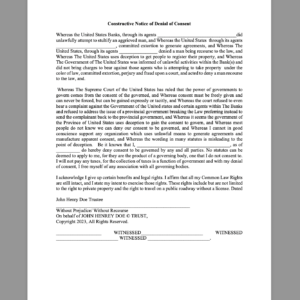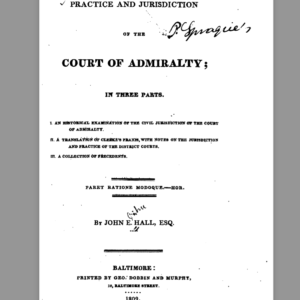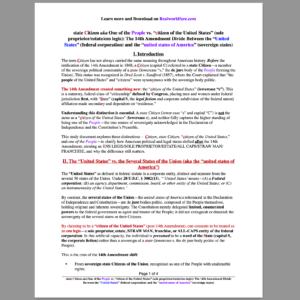This article clarifies the distinction between state citizens and nationals within the U.S. legal framework. Individuals born in a state are primarily considered state citizens, holding allegiance to their respective states rather than to the federal United States, which is defined as a federal corporation occupying only 10 square miles. Notably, there are no explicit references to “state citizen” in official documentation, which can lead to confusion about one’s legal identity. This ambiguity may be intentionally designed to centralize federal control, benefiting the federal system while making it difficult for the layperson to navigate their rights and status. Understanding these distinctions is crucial for illuminating the complexities of citizenship and legal identity in America.
1. Birth in a State vs. Federal Entity
- People are born in their state (e.g., California, Florida), not in the federal jurisdiction known as the “United States.” The “United States,” as defined in legal and constitutional terms, refers to the federal entity that is located in Washington, D.C., covering only 10 square miles of territory, and does not include the states themselves.
- Therefore, when a person is born, they are first and foremost a citizen of their state, not a citizen of the “United States.” The birth certificate they receive is a state-issued birth certificate, not a federal or “United States” birth certificate.
2. Nationals vs. Citizens: Legal Definitions
- In the U.S. Code (specifically 8 U.S. Code § 1401), the term “national” refers to a person who owes allegiance to the United States but may not necessarily be born within the District of Columbia or its territories. However, it’s important to note that the term “state citizen” no longer exists or is referenced in any official or everyday documentation, nor is the term “national” prominently used in everyday contexts.
- Despite this, the code’s definition of a “national” tries to cover those born in the states who owe allegiance to the United States but remain outside its federal jurisdiction (i.e., not born in Washington, D.C., or federal territories). This code does not explicitly acknowledge state citizenship, which may be seen as an attempt to unify legal statuses under federal terms.
3. State Citizens as Foreign to the United States
- Since a person is born in their state and their primary allegiance is to that state, they are foreign to the federal entity known as the “United States” (a federal corporation under 28 U.S. Code § 3002(15)). According to this statute:
“(15) ‘United States’ means— (A) a Federal corporation;”
- This definition confirms that the “United States” governs the District of Columbia and other territories, but not the states themselves, which remain sovereign entities. This reinforces the idea that individuals born in a state are not automatically under federal jurisdiction unless they expressly agree to such status.
- The lack of official documentation referring to state citizenship could be viewed as an intentional effort to consolidate power under federal jurisdiction. By omitting these terms, the federal government ensures that its own definitions, such as “United States citizen,” take precedence.
4. No Mention of State Citizens in the United States Code
- The U.S. Code does not explicitly mention “state citizens” because state citizenship operates independently from federal definitions. State citizens, who owe allegiance to their state and possess a state birth certificate, are not the same as “United States citizens” (who are legally considered subjects of the federal entity located in Washington, D.C.).
- The federal definition of a “national” in 8 U.S. Code § 1401 tries to encompass those born in the states (who owe allegiance to their state) under its jurisdiction without explicitly addressing their separate legal status as state citizens. This lack of recognition for “state citizens” may be seen as an attempt to centralize control and redefine the population under federal terms.
5. Implications of Being a State Citizen (National)
- As state citizens, people are born outside the jurisdiction of the “United States” federal entity, making them foreign in relation to the federal corporation. Their birth certificates, issued by their respective states, confirm their identity as state citizens. However, these documents no longer explicitly state “state citizen” or “national,” which could be seen as a deliberate omission to obscure state sovereignty.
- Many argue that this ambiguity is intentional; since the rules are made by the federal United States, it benefits them to structure the law in a way that consolidates power while leaving room for remedies—albeit difficult ones for the average person to decipher.
In Summary:
People are born as state citizens, with their primary allegiance to their state, not the federal United States entity. The federal code uses the term “national” to refer to these individuals who are not born within the federal jurisdiction but are nevertheless associated with the United States due to their state’s union. However, the absence of the term “state citizen” in everyday documents or official records could be a strategic move to prevent the public from asserting this status. This way, the federal government establishes dominance, but still provides remedies, which are intentionally complex, for those who know how to navigate the legal system. Understanding this distinction clarifies that the federal United States does not govern state citizens directly; instead, they remain sovereign individuals within their respective states, even if this status is not openly acknowledged in federal documentation.












